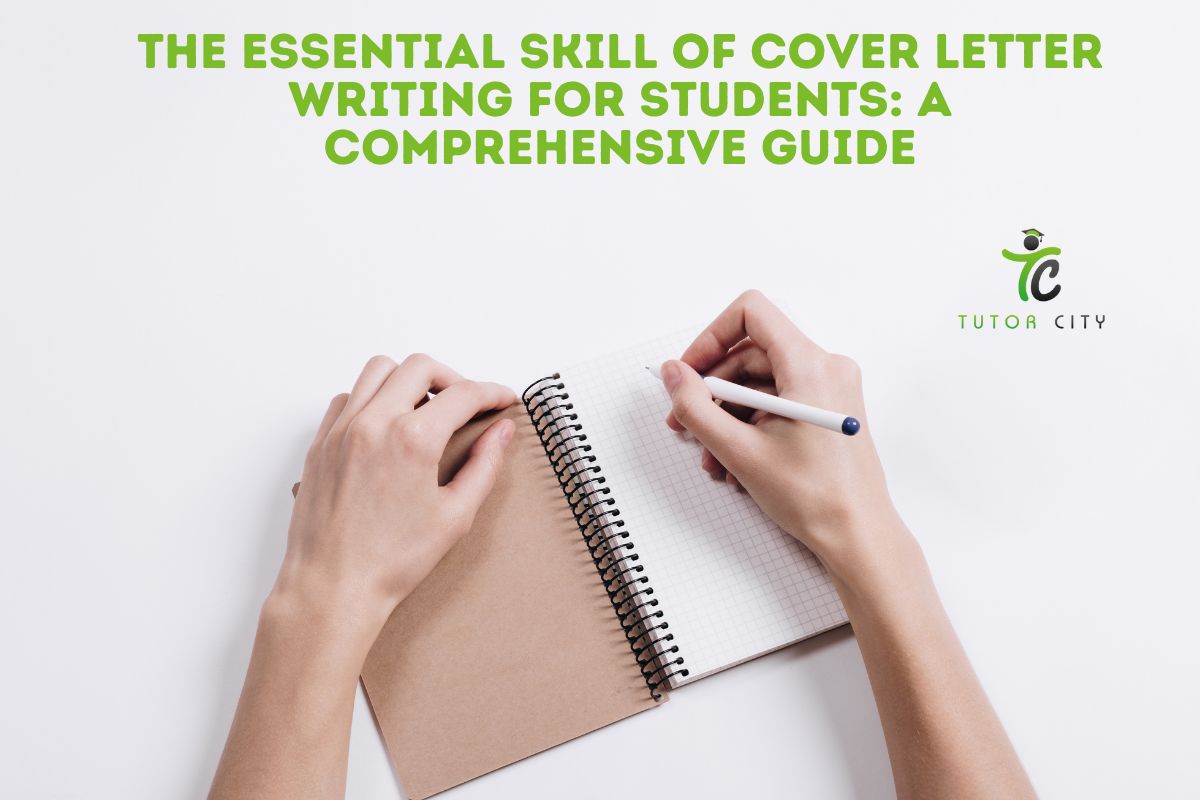
- Published by: Tutor City
- February 08, 2024
- Education
The Essential Skill of Cover Letter Writing for Students: A Comprehensive Guide
In an ever-competitive job market, the ability to craft an effective cover letter is an invaluable skill that can set candidates apart.
For students poised at the cusp of their professional lives, mastering this art is not just beneficial; it's imperative.
A well-written cover letter offers a unique opportunity to present oneself beyond the confines of a resume, showcasing personality, enthusiasm, and the specific value one can bring to a role.
This comprehensive guide aims to underscore the importance of cover letters for students and provide a step-by-step approach to crafting compelling narratives that resonate with potential employers.
Why Cover Letter Writing is Crucial for Students
1. First Impressions Count
Often, a cover letter is the first piece of communication between a job applicant and an employer.
It sets the tone for your application and can predispose the hiring manager towards viewing your resume and, by extension, you in a positive light.
2. Showcases Your Personality
Unlike the structured format of a resume, a cover letter offers the space to express your personality.
This personal touch can make you more memorable to employers. It can demonstrate how you're a cultural fit for the company.
3. Highlights Specific Interests and Abilities
A cover letter allows you to detail why you're interested in the specific position and company and how your skills and experiences make you the ideal candidate.
It's an opportunity to make direct connections between your abilities and the job requirements that may take time to be evident on your resume.
4. Demonstrates Communication Skills
Effective written communication is a prized skill in many professions. A well-crafted cover letter is proof of your ability to communicate clearly and persuasively.
5. Addresses Gaps or Concerns
If there are aspects of your resume that might raise questions (such as gaps in employment, changing fields, or lack of direct experience), a cover letter provides a platform to address these proactively and positively.
A Step-by-Step Guide to Writing an Effective Cover Letter
By following the outlined steps and tips, students can master the art of cover letter writing.
Download yourself a customizable cover letter template today.
Step 1: Research and Personalization
Before you begin writing, research the company and the position extensively. Understand their mission, values, culture, and the specifics of the role.
Use this information to personalize your cover letter, making clear why you're interested in this specific opportunity and how your values align with the company's.
Step 2: The Opening
Your opening paragraph should grab the reader's attention. Start by stating the position you're applying for and how you found out about it.
Then, succinctly express why you're excited about the opportunity and why you're a good fit based on your initial research.
Step 3: Body Paragraphs
This section is where you delve into the specifics of what you bring to the table. Break down the job description and match your skills and experiences with the requirements listed.
Use specific examples to illustrate your achievements and how they've prepared you for this role. Remember to focus not just on what you've done but also on what you can do for the company.
Step 4: Closing Paragraph
In your closing, reiterate your enthusiasm for the position and the company. Mention your desire to discuss further how you can contribute to the team in an interview. Thank them for considering your application.
Step 5: Professional Sign-off
End your cover letter with a professional closing like "Sincerely" or "Best regards," followed by your full name. If you're submitting a digital application, include a digital copy of your signature for a personal touch.
Additional Tips for Crafting Your Cover Letter:
- Tailor Each Letter: Avoid using a generic template for every application. Tailor each cover letter to the specific job and company, highlighting the most relevant skills and experiences.
- Keep It Concise: Aim for a maximum of one page. Hiring managers often sift through numerous applications, so a concise, impactful letter is more likely to be read in full.
- Use a Professional Tone and Format: While it's important to express your personality, maintain a professional tone throughout. Use a standard business letter format with professional fonts and margins.
- Proofread Thoroughly: Spelling or grammatical errors can undermine your application. Proofread your letter multiple times and consider having someone else review it as well.
- Follow Application Instructions: Some employers may specify particular details to include in your cover letter. Always adhere to these instructions to demonstrate your ability to follow directions.
Conclusion
For students stepping into the professional world, a cover letter is not just a formality; it's a personal marketing tool.
It provides a unique platform to articulate why you're the ideal candidate for a role beyond what your resume can convey.
Remember, a compelling cover letter not only showcases your qualifications but also your eagerness to contribute to the prospective employer's success.
With each application, refine and adapt your approach, using feedback and experiences to improve your cover letter writing skills continuously.






